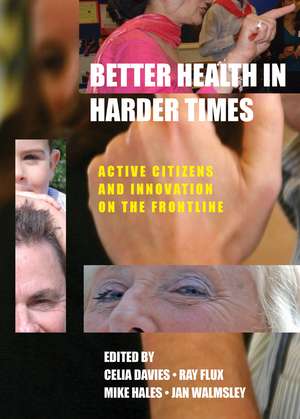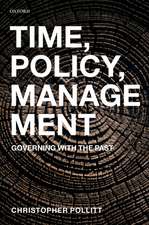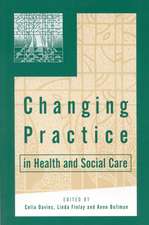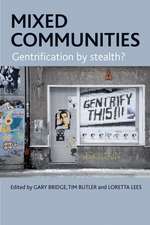Better Health in Harder Times: Active Citizens and Innovation on the Frontline
Editat de Jan Walmsley, Celia Davies, Mike Hales, Ray Fluxen Limba Engleză Hardback – 13 noi 2012
In the wake of current public services turmoil, this book reexamines the collective compact that created the UK’s public health services in the 1940s. Drawing on testimony from service users and service providers, the contributors explore topics such as new ways of living and working with long-term health conditions, meaningful and effective approaches to service redesign, use of information technology, leadership, coproduction, and quality of service. Better Health in Harder Times is a book composed of short, accessible contributions that will be of interest to a wide range of social-policy readers.
| Toate formatele și edițiile | Preț | Express |
|---|---|---|
| Paperback (1) | 306.37 lei 3-5 săpt. | |
| Bristol University Press – 13 noi 2012 | 306.37 lei 3-5 săpt. | |
| Hardback (1) | 957.08 lei 6-8 săpt. | |
| Bristol University Press – 13 noi 2012 | 957.08 lei 6-8 săpt. |
Preț: 957.08 lei
Preț vechi: 1007.44 lei
-5% Nou
Puncte Express: 1436
Preț estimativ în valută:
183.14€ • 191.69$ • 152.43£
183.14€ • 191.69$ • 152.43£
Carte tipărită la comandă
Livrare economică 31 martie-14 aprilie
Preluare comenzi: 021 569.72.76
Specificații
ISBN-13: 9781447306948
ISBN-10: 1447306945
Pagini: 190
Ilustrații: 8 figures, 11 tables
Dimensiuni: 152 x 229 x 15 mm
Greutate: 0.5 kg
Ediția:New.
Editura: Bristol University Press
Colecția Policy Press
ISBN-10: 1447306945
Pagini: 190
Ilustrații: 8 figures, 11 tables
Dimensiuni: 152 x 229 x 15 mm
Greutate: 0.5 kg
Ediția:New.
Editura: Bristol University Press
Colecția Policy Press
Notă biografică
Celia Davies is professor emeriti of health care at the Open University. Ray Flux is director of Civil Eyes Development Ltd. Mike Hales was a senior research fellow at the Centre for Research in Innovation Management at Brighton Business School. Jan Walmsley is visiting professor of leadership and workforce development at London South Bank University and visiting professor in the history of learning disability at the Open University.
Cuprins
Contributors’ biographical notes
Acknowledgements
List of abbreviations
Introduction
Acknowledgements
List of abbreviations
Introduction
Section 1: What business are we really in? Managing and self-managing well-being
1. Money matters! Personal budgets and direct payments
Nan Carle
2. Mainstreaming a chronic disease self-management programme—reflections on the NHS Expert Patients’ Programme
Jim Phillips
3. Health promotion—connecting people and place
Angela Flux
4. Is a long-term condition a disability? Schools of thought and language
Jan Walmsley
5. Life as an active citizen—full engagement, hard work and well-being
Mike Hales
6. Genuine partnership
Laurie Bryant
7. Overview: Looking for a new social contract around the NHS
Ray Flux
Section 2: Questions of quality—not just ticking boxes
8. A cataract journey
Jan Walmsley
9. Using Experience-Based Co-Design to make cancer services more patient-centred
Catherine Dale
10. How patient stories can change the commissioning culture
Georgina Craig
11. Turning ‘care’ into ‘share’
John Worth
12. Let me tell you a story
Tim Craft
13. Quality, leadership and moral responsibility
Rick Stern
14. Accounting for quality—eight tips for producing reports for the public about the quality of care
Catherine Foot
15. Overview: Quality—fantastic journey but bumpy ride?
Celia Davies
Section 3: Governance—how can we really work together?
16. Reminiscences of an advocate
David Sines
17. Researching together—pooling ideas, strengths and experiences
Rohhss Chapman and Lou Townson
18. Becoming accepted
Kate Ansell
19. Supporting ‘experts by experience’—a champion idea
Beryl Furr
20. Engaging communities—sharing the learning
Jane Keep
21. The engagement industry—some personal reflections
David Gilbert
22. Overview: Colliding worlds—the journey towards collaborative governance
Celia Davies
Section 4: How can information technology work for well-being? Data, dialogues and digital media
23. Records help us make sense of our lives
Yvonne Bennett
24. Records access and empowered patients, 2017
Brian Fisher
25. Learning to build a high-quality information system to support high-quality renal care
Lawrence Goldberg
26. Embracing social technology
Tris Taylor
27. Enlightening the next user
Neil Bacon
28. Patients’ stories—digital gifts that can change the world
Paul Hodgkin
29. Temptations of cheap data
Valerie Iles
30. Overview: Innovation in cultures, feelings and roles
Mike Hales
Section 5: What kind of learning, what kind of leadership?
31. Managers and leadership, now and then
Alastair Mant
32. Harnessing a Hydra—managing to change the NHS
Celia Davies
33. “Ask the patient what they want”
Jon Willis
34. The heart and art of leadership
Kate Hall
35. Health leadership for the 21st century—a new, holistic, co-productive endeavour
Ed Nicol and Simon Eaton
36. Forty years of innovation in community responses to the needs of people with learning difficulties
Simon Duffy
37. From hard to reach to within reach—the ‘how’ of community engagement in the era of the Big Society
Malik Gul
38. Disciplined conversation, facilitated dialogue, measured progress
Tim Sims and Fiona Reed
39. Leadership as if people matter—the Innovative Headteachers Programme
Ian Cunningham
40. Overview: What kind of leadership?
Jan Walmsley
Postscript: Better health in harder times—towards a sustainable NHS
References
Index
Recenzii
"This invaluable text will ensure that the current political rhetoric 'no decision about me without me' will become the inclusive, collaborative reality, so urgently required in the current austere health economy."
"A wealth of fascinating and insightful reflections on the relationship between people and their healthcare. A must-read for all: the ‘usual suspects’ and those coming new to the field, particularly those charged with taking this agenda forward in today's NHS."













